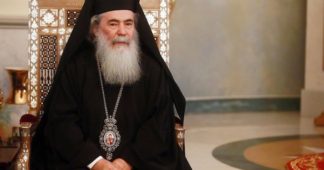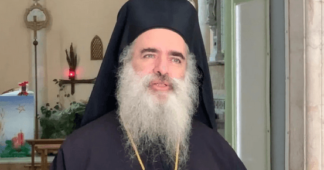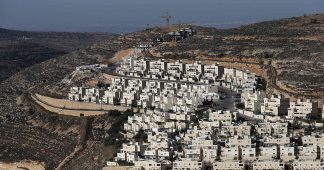EU expresses ‘deep concern over the implications’ of police and settler takeover of Greek Orthodox church land
Dec 30, 2022
The seizure of a plot of Greek Orthodox land by Israeli settlers and police could “pose a serious threat to the peaceful coexistence” of Muslims, Christians and Jews in Jerusalem, the European Union (EU) warned on Friday.
On Tuesday this week, dozens of Israeli settlers stormed a five-dunam (5,000 square metre) piece of land owned by the Greek Orthodox church in the Palestinian Silwan neighbourhood of the Old City in occupied East Jerusalem.
The settlers then fenced it off and installed surveillance cameras, with the protection of the police.
Silwan residents rushed to the scene to stop the land confiscation but were assaulted by security forces. Three young Palestinians were arrested, according to local media.
“Attempts to take over the property of Christian Churches must be halted”, the EU said in its statement, stressing its “deep concern over the implications of this action on the property rights of the Christian Churches in Jerusalem.
“The EU calls to protect the Status Quo and the Holy Sites, including Christian ones. The special status and character of Jerusalem and its Old City must be preserved and respected by all,” it read.
The Greek Orthodox Monastery owns the land in Silwan, which is part of the city’s Greek Orthodox Patriarchate, according to Wadi Hilweh Information Center, which monitors Israeli violations in the area.
The centre said that the Sumerian family have been farming and guarding the land for 70 years, under a leasing agreement with the owner.
Silwan, home to more than 60,000 Palestinians and strategically located south of Al-Aqsa Mosque and the Western Wall, has been the target of Israeli settler expansion for years.
Hundreds of families in Silwan face the threat of expulsion, either through lawsuits by powerful settler groups or administrative eviction orders by the Israeli-run Jerusalem municipality, which is seeking to build tourist parks themed around biblical stories and figures.
Israel’s control of East Jerusalem, occupied since 1967, violates several principles under international law, which stipulates that an occupying power has no sovereignty in the territory it occupies and cannot make any permanent changes there.
Criticism of the church
Activists fear the land in Silwan owned by the Greek Orthodox church is particularly vulnerable to being seized by settlers.
Palestinian groups have long criticised the church for its dealings with settler groups and for allegations of bribery and fraud.
In 1951, church-owned land in West Jerusalem was rented to the Jewish National Fund for a period of 99 years. Today, the land houses most Israeli state institutions, including Israel’s parliament, the Knesset.
In March, Israeli police and settlers took control of parts of the historic Petra hotel, which has been the subject of a years-long legal challenge between the Greek Orthodox Patriarch and settler group Ateret Cohanim.
Last year, the patriarch sparked outrage after revealing plans to sell around 11 hectares of church property to two Israeli companies seeking to connect a Bethlehem-area settlement to Jerusalem. Israeli settlements are illegal under international law.
At the time, the Orthodox Central Council in Palestine, a Palestinian Christian grassroots group, slammed the $39m deal as one that would “destroy the tourism-based economy of Bethlehem”.
We remind our readers that publication of articles on our site does not mean that we agree with what is written. Our policy is to publish anything which we consider of interest, so as to assist our readers in forming their opinions. Sometimes we even publish articles with which we totally disagree, since we believe it is important for our readers to be informed on as wide a spectrum of views as possible.











